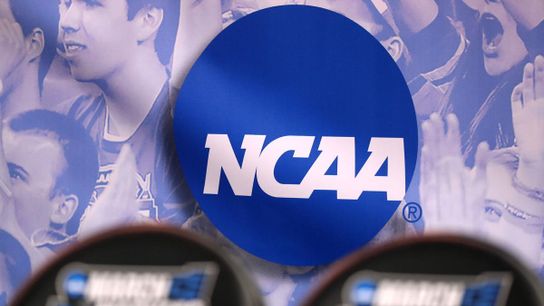The NCAA Division I Council will consider a proposal to allow athletes and staff to wager on professional sports, the organization announced Tuesday. Interestingly, the change would only go into effect if Division II and Division III also vote to lift their prohibitions on professional sports gambling, which will take place next month. All rules regarding betting on college sports will remain in place.
The reasons for this possible rules change are several, all of them interesting:
-- There's a general fatigue around enforcing gambling rules considering how wide-spread sports betting has become in American culture ever since the Supreme Court overturned the federal ban on sports wagering in 2018. Thirty-nine states now allow sports betting, and it's become a common pastime among young people (more on this below), and generally there's a feeling that the NCAA and its members are wasting their time prosecuting college golfers for putting $100 worth of action on a Monday Night Football game.
"NCAA rules prohibiting sports betting at all levels were written and adopted at a time when sports gambling was largely illegal nationwide," NCAA DI Council chairman and Illinois AD Josh Whitman said.
-- There's also a feeling that punishing sports betting may actually be making a serious problem worse. As Pat Forde wrote for Sports Illustrated earlier this week:
Toward that end, campus athletic mental-health practitioners have been given more information to treat problem gambling in a manner similar to other addictive behaviors. The hope is that gambling addicts would be more willing to admit a wagering problem and seek help if they weren’t afraid of losing eligibility for betting on pro sports.
“One of the big things that’s not really being tracked is gambling as a mental-health issue,” one source says. “We should be helping people instead of whacking them with ineligibility.”
"Throughout our discussions, the council has remained focused on student-athlete wellness and educating student-athletes about the risks and potentially harmful impacts of betting," Whitman said.
In September, Fairleigh Dickinson University published a survey that found 10 percent of young men exhibited behavior consistent with a gambling addiction, more than three times the national average. "By meeting student-athletes where they are, schools may be more effective at preventing, identifying and supporting student-athletes with problematic gambling behaviors. Regardless of the change, schools are encouraged to use the many sports betting resources already available," NCAA chief medical officer Dr. Deena Casiero said.
-- Unspoken by the NCAA, but money is also undoubtedly a factor. Every athletics department in the country is looking for new revenue streams right now, and the gambling industry has become an attractive option for many. Last week, Iowa State announced that Cyclone Sports Properties and its We Will Collective have reached a sponsorship agreement with Elite Casino Resorts. This is the same Iowa State (along with Iowa) that found itself in a major gambling scandal just two years ago. (Five current or former Cyclones football staffers collectively wagered more than $100,000 across 6,200 bets, and routinely wagered on Iowa State men's and women's basketball games -- which would still be a violation of NCAA rules.)
Allowing their staff and players to bet on professional sports might make athletics departments feel less gross about taking a casino's money.
-- Sparked by the Iowa/Iowa State scandal, the NCAA reviewed its gambling policies and found they were more restrictive than other major sports organizations of similar stature.
-- However, Forde reports that it's not a guarantee that the ban will be lifted. Opponents have made the slippery-slope argument against lifting the prohibition, reasoning that normalizing betting on pro sports will make it more likely that staffers and athletes will then bet on college sports.
To that end, the NCAA has made it a major priority to lobby against allowing sports books to create prop bets around college athletes. In March, the NCAA touted that 18 states have banned athlete prop bets while launching its Don't Be a Loser campaign in conjunction with the opening of the Division I basketball tournament.
NCAA president Charlie Baker says allowing prop bets risks the safety of both the athletes themselves and the integrity of the competitions.
“Go sit behind the bench at one of these conference tournaments and listen to the bettors, yell and scream at these kids about their performance,” Baker said in March. “‘You need to do better. I’m losing money on you.’ Or the stuff that shows up online which we track in our tournaments, which is way more vicious and brutal than that. It’s really, this is a problem.”
So, one faction of the D1 Council is uncomfortable with of knocking down the wall between the NCAA and such a risky activity like gambling.
“It’s been hotly debated,” one source told Forde. “This is not a slam dunk.”
